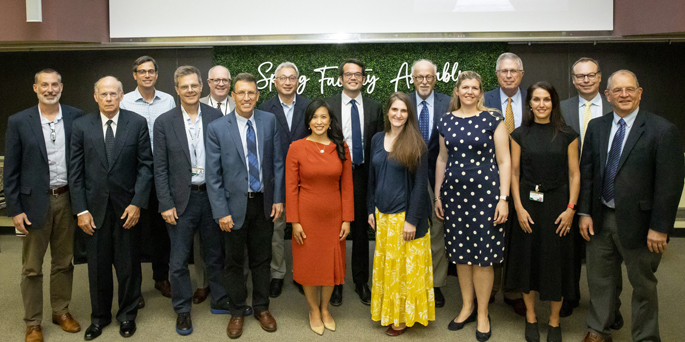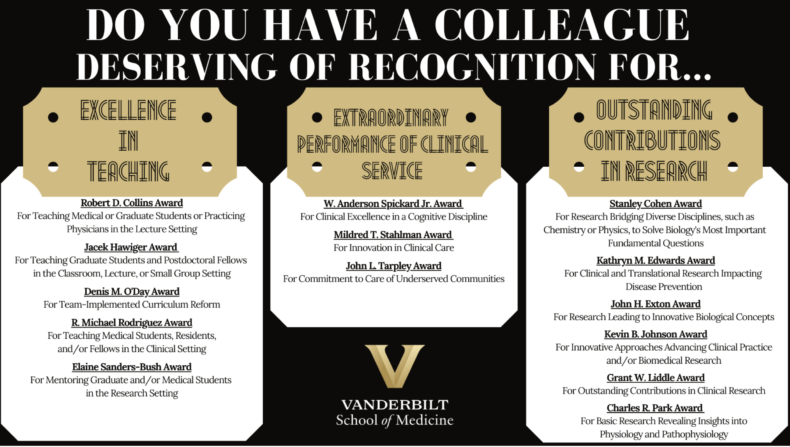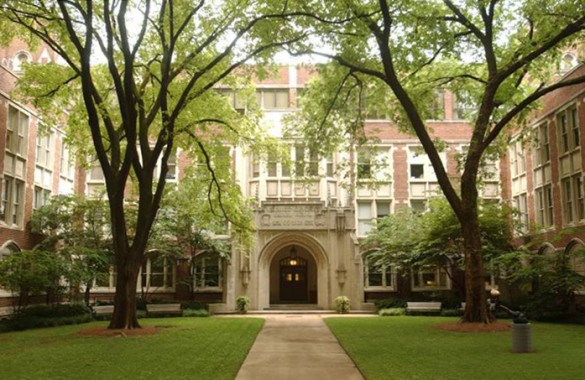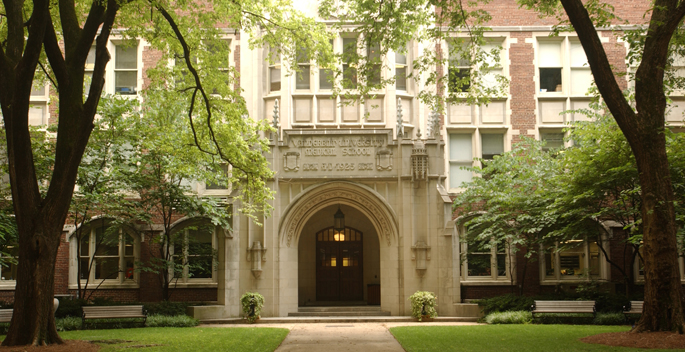
The 2022 Vanderbilt University School of Medicine Academic Enterprise Awards for Excellence in Teaching, Extraordinary Performance of Clinical Service, and Outstanding Contributions to Research were presented April 29 during the annual spring faculty meeting. The recipients are listed below.
EXCELLENCE IN TEACHING
ROBERT D. COLLINS AWARD for Teaching Medical or Graduate Students or Practicing Physicians in the Lecture Setting
Steven Eskind, MD, assistant professor of Surgery. A general and vascular surgeon, Eskind is one of five master teachers in the Section of Surgical Sciences. Since 2010 he has directed the Surgical Clerkship Program of Surgery in the School of Medicine. He also has served as director or co-director of numerous other elective courses in the Immersion Phase in the School of Medicine.
JACEK HAWIGER AWARD for Teaching Graduate Students and Postdoctoral Fellows in the Classroom, Lecture or Small Group Setting
Hakmook Kang, PhD, associate professor of Biostatistics. Kang directs the Intellectual and Developmental Disabilities Research Center (IDDRC) Data Sciences Core in the Vanderbilt Kennedy Center for Research on Human Development. Under his leadership, in 2020 the core implemented an internal grant program to foster collaboration between Vanderbilt Kennedy Center researchers and trainees at the Vanderbilt Data Science Institute. Since 2013, Kang has mentored multiple students and has twice received Golden Apple Awards from his students in Biostatistics for his outstanding instruction and “altruistic commitment” to student classroom learning.
DENIS M. O’DAY AWARD for Team-Implemented Curriculum Reform.
Rachel Goode, MD, assistant professor of Pediatrics, and Jeffrey Hine, PhD, assistant professor of Pediatrics.
Goode is medical director of the Neonatal Developmental Follow-up Program Clinic, associate program director of the Developmental-Behavioral Pediatrics Fellowship program, associate director of the Vanderbilt Consortium Leadership Education in Neurodevelopmental Disabilities, and core rotation director for the pediatric residents’ rotation in developmental-behavioral pediatrics.
A clinical psychologist, Hine directs the Primary Care Outreach within the Vanderbilt Kennedy Center/Treatment and Research Institute for Autism Spectrum Disorders. He specializes in assessing and treating children with autism spectrum disorder and other neurodevelopmental disabilities and is a recognized leader in developing and implementing novel models of service delivery and training, specifically through telemedicine and integration of medical homes.
R. MICHAEL RODRIGUEZ AWARD for Teaching Medical Students, Residents and/or Fellows in the Clinical Setting
Janice Law, MD, associate professor of Ophthalmology. Law is vice chair for Education in the Department of Ophthalmology and Visual Sciences, director of Medical Student Education for Ophthalmology in the School of Medicine, and co-creator of the Ophthalmology-Neurology Clerkship. During the pandemic, she co-founded the Virtual Ophthalmology Mentoring Program, which connects medical students across the country with ophthalmologists who provide research opportunities and career guidance. Law has received numerous honors for her contributions to medical education and commitment to growing the global community of leaders in ophthalmology.
ELAINE SANDERS-BUSH AWARD for Mentoring Graduate and/or Medical Students in the Research Setting
Fiona Harrison, PhD, associate professor of Medicine. Harrison is an animal behaviorist known internationally for her research on the impact of vitamin C and other nutrients on brain health, including memory and behavior. Through her lab and as director since 2015 of the Vanderbilt Mouse Neurobehavioral Core, she mentors medical and graduate students and postdoctoral fellows, as well as undergraduates at Vanderbilt and other institutions. In 2019 she was named Mentor of the Year for her contributions to the Vanderbilt Brain Institute’s Postdoctoral Program in Functional Neurogenomics.
EXTRAORDINARY PERFORMANCE OF CLINICAL SERVICE
ANDERSON SPICKARD JR. AWARD for Clinical Excellence in a Cognitive Discipline
Thomas Golper, MD, professor of Medicine. Golper is a nationally known leader and innovator in the development and advancement of home dialysis programs. Since his arrival at VUMC in 1999, he helped establish and grow the Medical Center’s home dialysis program into one of the largest and most successful programs in the country. He helped establish and is the current director of a national course for fellows and practicing nephrologists called Home Dialysis University, and is a highly regarded mentor of clinicians, educators and researchers in nephrology.
MILDRED T. STAHLMAN AWARD for Innovation in Clinical Care
Kathryn Dahir, MD, professor of Medicine. Dahir is internationally recognized for developing innovative clinical approaches to the treatment of metabolic bone disorders. The Program for Metabolic Bone Disorders, which she co-founded and co-directs, is now a collaborative Medicine-Pediatrics multispecialty clinic that receives worldwide referrals and trains physicians, nurses, physical therapists and dental providers to care for patients with these rare genetic disorders. Active in international research collaborations, Dahir also has testified before the U.S Food and Drug Administration on behalf of patients for approval of new investigational therapies.
JOHN L. TARPLEY AWARD for Commitment to Care of Underserved Communities
Mark Newton, MD, professor of Anesthesiology and interim vice chair of Pediatric Anesthesiology. Newton is an international leader in global heath focused on anesthesia training and education outcome research in low- and middle-income countries, primarily in Africa. He has spent 23 years working and living with his family in Kenya. As director of Vanderbilt International Anesthesia, and Anesthesia Global Health and Development in the Department of Anesthesiology, he oversees the training of anesthesia providers, including rotating VUMC residents and fellows, with the aim of improving anesthesia capacity and access to safe surgery in the region.
OUTSTANDING CONTRIBUTIONS TO RESEARCH
STANLEY COHEN AWARD for Research Bridging Diverse Disciplines, such as Chemistry or Physics, to Solve Biology’s Most Important Fundamental Questions
Robert Coffey Jr., MD, the John B. Wallace Professor of Medicine and Ingram Professor of Cancer Research, professor of Cell & Developmental Biology. Coffey is internationally known for his work on the trafficking of extracellular proteins, or ligands, that bind the epidermal growth factor receptor (EGFR) and the role they play in gastrointestinal cancer. His lab has identified a new mode of EGFR ligand signaling via extracellular vesicles called exosome and discovered an inducible negative EGFR regulator that acts as a tumor suppressor. Coffey is founder and co-director of the Epithelial Biology Center at VUMC, and a primary investigator in the Vanderbilt-Ingram Cancer Center.
KATHRYN M. EDWARDS AWARD for Clinical and Translational Research Impacting Disease Prevention
James Crowe, Jr., MD, Ann Scott Carell Professor of Pediatrics and professor of Pathology, Microbiology & Immunology. Crowe and his colleagues have pioneered techniques for isolating human “monoclonal” antibodies that can neutralize — with laser-like focus — a host of pathogenic viruses including Zika, HIV, influenza, Marburg, Ebola, RSV and SARS-CoV-2, the COVID-19 virus. In December, a long-acting, injectable, first-of-its-kind antibody combination discovered in the Crowe lab and optimized by AstraZeneca received emergency authorization from the FDA to protect uninfected, high-risk patients from COVID-19. Crowe, who directs the Vanderbilt Vaccine Center, has received numerous awards and honors for his accomplishments.
JOHN H. EXTON AWARD for Research Leading to Innovative Biological Concepts
Mark Denison, MD, Edward Claiborne Stahlman Professor of Pediatrics, professor of Pathology, Microbiology & Immunology. Director of the Division of Pediatric Infectious Diseases, Denison is an internationally known authority on coronaviruses, including the current pandemic SARS-CoV-2. He and his colleagues have identified multiple critical and unique viral enzymes as novel targets for antiviral drugs, and they conducted preclinical testing of remdesivir and molnupiravir, which have been granted emergency use authorization to treat COVID-19. They also analyzed the ability of the Moderna vaccine to stimulate robust immune responses against SARS-CoV-2 in a Phase 1 clinical trial.
KEVIN B. JOHNSON AWARD for Innovative Approaches Advancing Clinical Practice and/or Biomedical Research
Jonathan Wanderer, MD, MPhil, professor of Anesthesiology and Biomedical Informatics. Wanderer is an innovative physician builder in clinical operations and patient care systems, particularly through the application of information technology to solve complex clinical and operational problems. At VUMC, he is medical director of Perioperative Informatics, which manages surgical applications from admission through recovery, a clinical director of HealthIT, and associate medical director of the Vanderbilt Anesthesiology & Perioperative Informatics Research Division and the Vanderbilt Preoperative Evaluation Center, which prepares patients for surgery.
GRANT W. LIDDLE AWARD for Outstanding Contributions in Clinical Research
Jordan Berlin, MD, professor of Medicine, and Ingram Professor of Cancer Research. Berlin is associate director for Clinical Research and director of the phase 1 research program at Vanderbilt-Ingram Cancer Center, and interim leader of the Division of Hematology and Oncology in the Department of Medicine. A specialist in gastrointestinal cancers and investigational drug development, he coordinates clinical and translational efforts across the cancer center and has successfully conducted multiple investigator-initiated and collaborative group trials. He also has helped launch and advance the careers of many students, residents, fellows and junior faculty.
CHARLES R. PARK AWARD for Basic Research Revealing Insights into Physiology and Pathophysiology
Kimryn Rathmell, MD, PhD, Hugh Jackson Morgan Professor of Medicine and chair of the Department of Medicine, professor of Biochemistry, and Physician-in-Chief, Vanderbilt University Hospital. Rathmell’s career as a physician-scientist has spanned molecular biology research in the pathogenesis of kidney cancer; nationally funded large-scale genomic studies of cancer; clinical investigations bringing new biomarkers, imaging modalities and therapies to patient care; and graduate and medical education. As a clinician, she has ushered in new lifesaving treatments and is a leader who has advocated for funding for kidney cancer research, including as a champion for rare subtypes of kidney cancer; and
Jeffrey Rathmell, PhD, Cornelius Vanderbilt Chair in Immunobiology, Professor of Pathology, Microbiology & Immunology and of Molecular Physiology & Biophysics. Rathmell studies immunometabolism — how nutrient and metabolic pathways can influence immune responses in normal and disease settings, such as cancer. By modulating the metabolism of cancer cells and inflammatory T cells, he and his colleagues seek to improve the effectiveness of anti-tumor immunotherapy. Rathmell directs the Vanderbilt Center for Immunobiology and is associate director of the Vanderbilt Institute for Infection, Immunology and Inflammation, and the Molecular Pathology & Immunology PhD Program.















